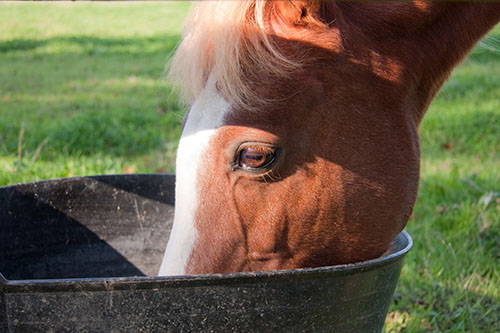Feeding Beet Pulp to Horses
Jan 10, 2023

Beet pulp, the fibrous material left over after sugar is extracted from sugar beets, is a versatile and inexpensive source of fiber and nutrients for horses. Beet pulp is particularly useful for adding calories to the equine diet while avoiding digestive and metabolic diseases associated with feeding grains.
The digestible energy (calories) provided by beet pulp is similar to that of oats, while its overall nutrient content is comparable to good quality grass hay. Feeding beet pulp is recommended for meeting the fiber, energy, and nutrient requirements for hard keepers, senior horses, and performance horses. Since it is high in fiber, beet pulp can be fed to replace up to 50% of the forage required by horses when pasture or good quality hay is not available. Beet pulp is also beneficial for horses because it is much lower in nonstructural carbohydrates (starch and sugar) compared to grains and some forages, thus reducing the risk for digestive and metabolic diseases, including laminitis and colic.
Contrary to popular belief, beet pulp does not have to be soaked, but soaking can help improve taste and increase water intake. Feeding dry beet pulp, whether in the shredded form or pellets, will not cause stomach rupture or choking. Choking is associated with rapid feeding behavior (boiling feed), not the feed itself. If beet pulp is soaked, warm or cold water can be used, but soaking time should be limited to a few hours to avoid spoiling and nutrient loss. As with any change to the diet, beet pulp should be added to the diet gradually over a few weeks to avoid digestive upset. Beet pulp is often fed with grain-based concentrates mixed in to improve acceptance by the horse. If beet pulp is fed solely as a forage supplement, horses should still receive at least 1% of their body weight in hay or pasture (12 lbs. for a 1,200 lb. horse). While forage is the most important part of the diet for all types of horses, beet pulp can be a useful component of the diet by providing highly digestible fiber when hay or pasture alone is not enough.
For more content like this, check out the latest issue of The Cooperator!
The digestible energy (calories) provided by beet pulp is similar to that of oats, while its overall nutrient content is comparable to good quality grass hay. Feeding beet pulp is recommended for meeting the fiber, energy, and nutrient requirements for hard keepers, senior horses, and performance horses. Since it is high in fiber, beet pulp can be fed to replace up to 50% of the forage required by horses when pasture or good quality hay is not available. Beet pulp is also beneficial for horses because it is much lower in nonstructural carbohydrates (starch and sugar) compared to grains and some forages, thus reducing the risk for digestive and metabolic diseases, including laminitis and colic.
Contrary to popular belief, beet pulp does not have to be soaked, but soaking can help improve taste and increase water intake. Feeding dry beet pulp, whether in the shredded form or pellets, will not cause stomach rupture or choking. Choking is associated with rapid feeding behavior (boiling feed), not the feed itself. If beet pulp is soaked, warm or cold water can be used, but soaking time should be limited to a few hours to avoid spoiling and nutrient loss. As with any change to the diet, beet pulp should be added to the diet gradually over a few weeks to avoid digestive upset. Beet pulp is often fed with grain-based concentrates mixed in to improve acceptance by the horse. If beet pulp is fed solely as a forage supplement, horses should still receive at least 1% of their body weight in hay or pasture (12 lbs. for a 1,200 lb. horse). While forage is the most important part of the diet for all types of horses, beet pulp can be a useful component of the diet by providing highly digestible fiber when hay or pasture alone is not enough.
For more content like this, check out the latest issue of The Cooperator!